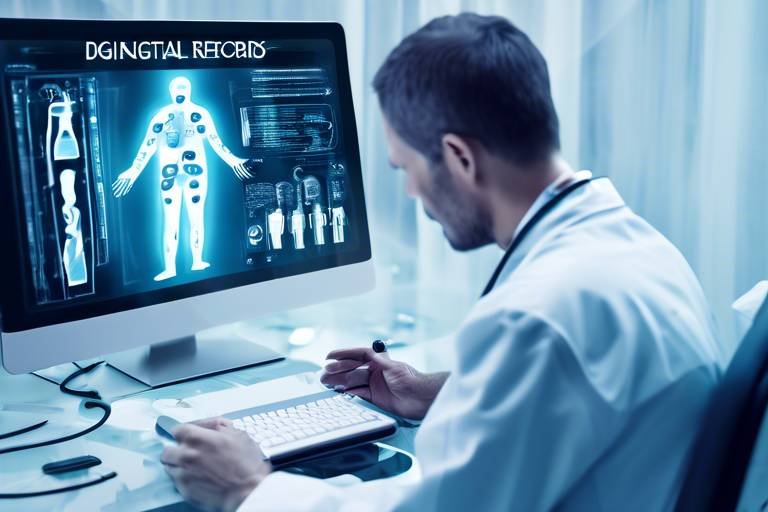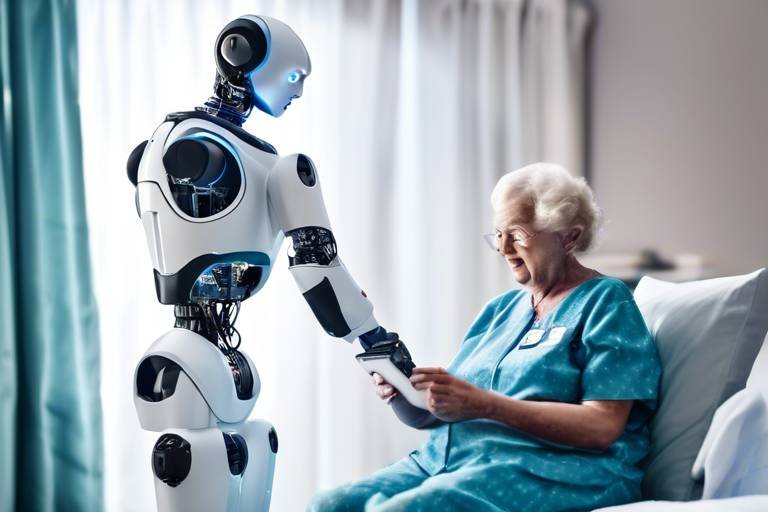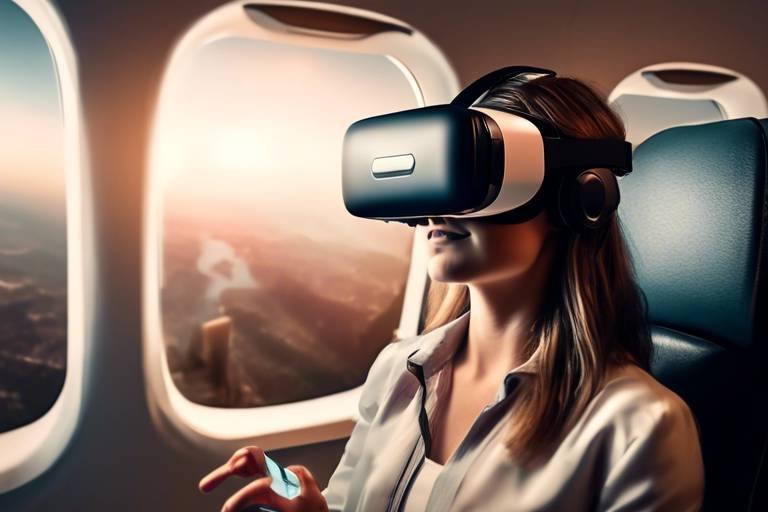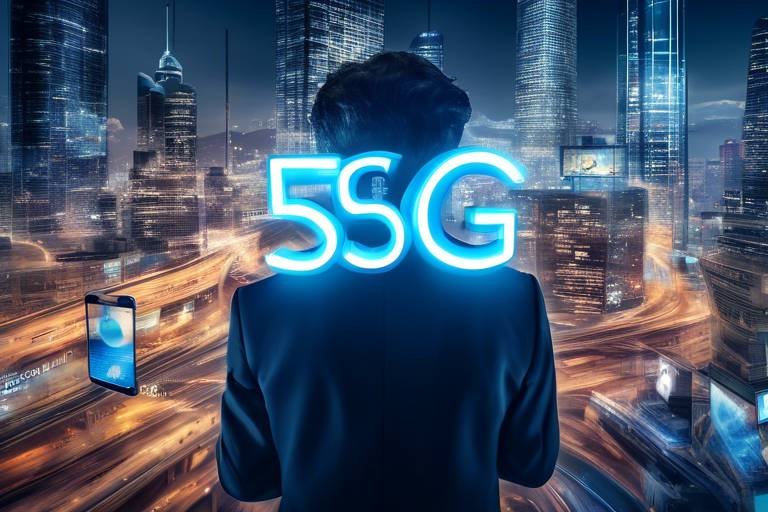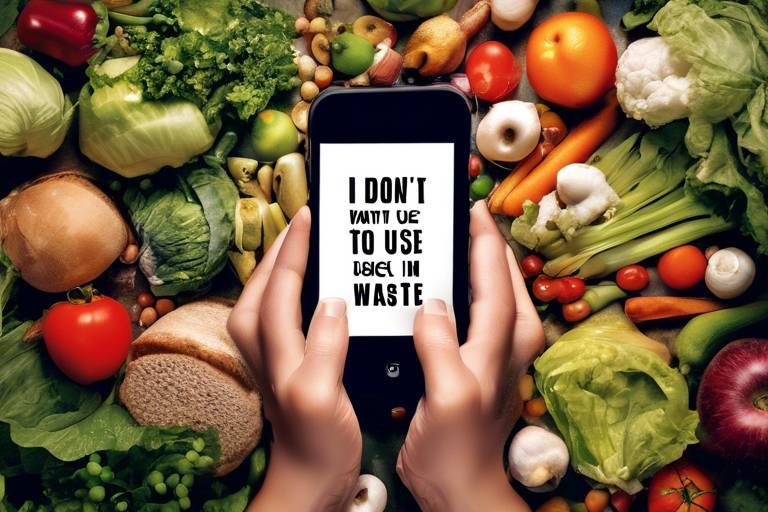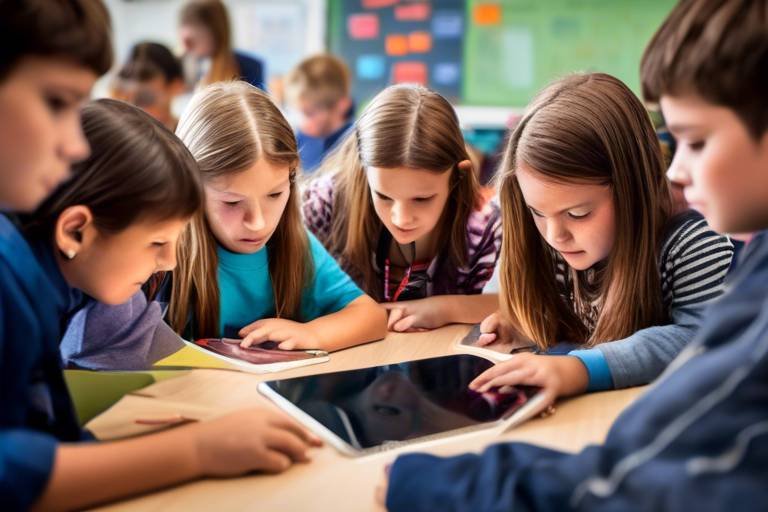Future Trends in Personalized Nutrition Technologies
In today's fast-paced world, the concept of personalized nutrition is gaining traction like never before. Imagine a world where your diet is tailored specifically to your unique genetic makeup, lifestyle choices, and health conditions. Sounds futuristic, right? Well, it’s not just a dream anymore! With the rapid advancements in technology, we are on the brink of a nutritional revolution that promises to enhance our well-being on an individual level. This article delves into the exciting trends shaping the future of personalized nutrition technologies, exploring how they can transform our dietary habits and health outcomes.
Nutrigenomics is a fascinating field that examines the intricate relationship between our genes and the nutrients we consume. By understanding how our genetic makeup influences our response to different foods, we can make informed dietary choices that optimize our health. For instance, genetic testing can reveal whether you have a predisposition to certain conditions, such as lactose intolerance or gluten sensitivity. Armed with this knowledge, you can adjust your diet accordingly, avoiding foods that may trigger adverse reactions. This can lead to improved health outcomes and a better quality of life, making nutrigenomics a cornerstone of personalized nutrition.
The rise of wearable health technologies is revolutionizing how we monitor our health. Devices like fitness trackers and smartwatches provide real-time data about our physical activity, heart rate, and even sleep patterns. But how does this relate to nutrition? Well, these devices can help create personalized nutrition plans based on individual activity levels and metabolic responses. For example, if your wearable device indicates that you've had a particularly active day, your nutrition plan can adjust to ensure you're fueling your body adequately. This dynamic approach to nutrition allows for flexibility and responsiveness to your body's needs.
As wearable technologies advance, the integration with mobile applications is becoming increasingly seamless. These apps not only allow users to track their physical activity but also their nutrition and health metrics. Imagine logging your meals and receiving instant feedback on how they align with your health goals! This integration enhances the personalized nutrition experience, making it easier for individuals to stay on track. Furthermore, many of these apps utilize data analytics to provide tailored meal suggestions, creating a comprehensive ecosystem for health management.
Artificial intelligence (AI) is at the forefront of transforming data analysis in the nutrition sector. By leveraging machine learning algorithms, AI can predict individual responses to various foods and dietary patterns. This means that instead of relying on generic dietary guidelines, you can receive customized recommendations that suit your unique biology. For instance, if AI determines that a specific nutrient helps improve your energy levels, it can suggest foods rich in that nutrient. This level of personalization is groundbreaking and paves the way for a healthier future.
However, with the rise of personalized nutrition technologies comes significant concerns regarding data privacy. The use of personal health data raises questions about how this information is stored, shared, and protected. It is crucial to ensure that sensitive health information remains secure while still allowing for the advancements that personalized nutrition offers. Companies must prioritize data security measures, ensuring that users can trust the platforms they engage with. After all, the last thing anyone wants is to compromise their private health information.
Meal planning services are evolving to offer personalized options that cater to individual preferences and health goals. Imagine having a meal plan that not only aligns with your nutritional needs but also considers your taste preferences! This level of customization can enhance dietary adherence and satisfaction, making it easier for individuals to stick to their health objectives. By utilizing data from wearable devices and mobile apps, these services can create tailored meal plans that evolve with your lifestyle changes.
As we look to the future, innovative food technologies are shaping the landscape of nutrition. From lab-grown foods to personalized supplements, these advancements promise to cater to individual dietary needs and preferences. For instance, lab-grown meats can provide a sustainable protein source while minimizing environmental impact. Personalized supplements can ensure that individuals receive the specific nutrients they lack, further enhancing their health. The integration of these technologies into our daily lives marks a significant step towards a more personalized approach to nutrition.
One of the most exciting developments in food technology is the advent of 3D printing. This innovative technique allows for the creation of customized meals tailored to individual nutritional needs. Imagine printing a meal that perfectly aligns with your dietary restrictions and preferences, all at the push of a button! This technology not only offers convenience but also the potential for enhanced nutritional value, making it a game changer in personalized nutrition.
As personalized nutrition technologies advance, it is essential to consider their impact on sustainability. Innovations in this space should align with sustainable practices to promote health without compromising environmental integrity. For example, lab-grown foods can reduce the carbon footprint associated with traditional farming methods. By prioritizing sustainability alongside personalization, we can create a healthier planet for future generations.
- What is personalized nutrition? Personalized nutrition involves tailoring dietary recommendations based on individual genetic, lifestyle, and health data.
- How does nutrigenomics work? Nutrigenomics studies the interaction between genes and nutrients to provide personalized dietary suggestions.
- What role do wearable devices play in personalized nutrition? Wearable devices track health metrics and physical activity, helping to create tailored nutrition plans.
- Are there privacy concerns with personalized nutrition technologies? Yes, protecting personal health data is crucial as these technologies become more prevalent.

Advancements in Nutrigenomics
Nutrigenomics is a fascinating field that dives deep into the intricate relationship between our genes and the nutrients we consume. Imagine being able to unlock the secrets of your DNA to discover the best foods for your body! This is not just a dream; it’s becoming a reality thanks to advancements in genetic testing and personalized nutrition. By analyzing genetic variants, nutrigenomics helps us understand how our bodies respond to different nutrients and dietary patterns, paving the way for tailored dietary recommendations that can optimize health outcomes.
One of the most exciting aspects of nutrigenomics is its potential to prevent chronic diseases. For instance, individuals with specific genetic markers may be more susceptible to conditions like diabetes or heart disease. By understanding these genetic predispositions, personalized nutrition plans can be created that not only cater to individual tastes but also target these risks. This proactive approach to health can empower individuals to make informed dietary choices, ultimately leading to better health and wellbeing.
Furthermore, the integration of nutrigenomics with other health technologies amplifies its impact. For example, when combined with lifestyle data from wearable devices, the insights gained from genetic testing can be even more precise. This synergy allows for a holistic view of an individual’s health, taking into account not just their genetic makeup but also their daily habits and activities. Imagine a world where your meal plan is crafted based on your unique genetic profile, exercise routine, and even your stress levels—this is the future that nutrigenomics is steering us toward.
However, while the potential benefits are immense, there are challenges to consider. The science of nutrigenomics is still evolving, and researchers are continually uncovering new connections between genes and nutrition. This means that recommendations may change as we learn more, which can be both exciting and a bit overwhelming for consumers. It’s essential to stay updated with the latest research and consult with professionals who can interpret genetic data effectively.
In conclusion, advancements in nutrigenomics are setting the stage for a revolution in personalized nutrition. By leveraging genetic insights, we can create diets that are not only tailored to our preferences but also aligned with our unique biological needs. This personalized approach holds the promise of better health outcomes and a deeper understanding of how we can nourish our bodies. As we move forward, the integration of these advancements into everyday life will undoubtedly transform how we think about food and nutrition.
- What is nutrigenomics? Nutrigenomics is the study of how our genes interact with the nutrients we consume, helping to tailor dietary recommendations to individual needs.
- How can genetic testing improve my diet? Genetic testing can provide insights into your unique nutritional needs, helping you make informed choices that optimize your health.
- Are there any risks associated with nutrigenomics? While the benefits are significant, it's essential to consult with healthcare professionals to interpret genetic data correctly and avoid potential misinformation.
- How does nutrigenomics integrate with wearable technology? Wearable devices can track physical activity and biometrics, which, when combined with genetic data, allows for more personalized nutrition plans.

Wearable Health Technologies
In recent years, have taken the world by storm, transforming how we monitor our health and wellness. Imagine a world where your wrist not only tells time but also tracks your heart rate, sleep patterns, and even your stress levels! These devices are revolutionizing the way we approach personalized nutrition by providing real-time data that can be tailored to fit individual needs. With the ability to collect vast amounts of data, wearables can help create a more precise picture of our health, leading to better dietary choices and improved outcomes.
Wearable devices, such as smartwatches and fitness trackers, are equipped with sensors that monitor various biometric data. This includes metrics like:
- Heart Rate: Understanding how your heart responds to different activities can guide your nutritional choices.
- Calories Burned: Knowing how many calories you burn daily helps tailor your intake for weight management.
- Activity Levels: Tracking your activity can inform your dietary needs, ensuring you fuel your body appropriately.
For instance, if a wearable device shows that you have a high activity level on certain days, it can suggest increased caloric intake or specific nutrient boosts to support recovery and energy levels. On the other hand, on days with less activity, it might recommend a lighter meal plan. This dynamic approach to nutrition means that you can adapt your diet based on your lifestyle rather than sticking to a one-size-fits-all plan.
Moreover, the integration of wearable technology with mobile applications enhances the user experience. These apps can analyze your data and provide tailored recommendations, making it easier to stay on track with your health goals. For example, a fitness app linked to your wearable could suggest a pre-workout snack high in carbohydrates if it detects that you’re about to engage in a vigorous workout session. This level of personalization is not just a trend; it's a significant leap towards a healthier lifestyle.
However, it's essential to note that while these technologies are incredibly beneficial, they are not without their challenges. As we embrace the future of personalized nutrition, we must also consider the implications of data privacy. With so much personal health information being collected, securing that data becomes paramount. Users must be aware of how their information is used and stored, ensuring that their journey towards better health does not come at the cost of their privacy.
In summary, wearable health technologies are not just gadgets; they are powerful tools that can significantly enhance our understanding of personal nutrition. By providing real-time insights into our bodies, they enable us to make informed dietary choices that align with our unique lifestyles and health goals. As we look forward to the future, the integration of these technologies into our daily lives will undoubtedly pave the way for a more personalized and effective approach to nutrition.

Integration with Mobile Apps
In today's fast-paced world, the integration of mobile applications with wearable health technologies is nothing short of revolutionary. Imagine having a personal nutritionist right in your pocket! These apps are designed to seamlessly connect with devices that monitor your health metrics, providing a holistic view of your dietary habits and physical activity. With just a few taps, users can track everything from their daily calorie intake to their hydration levels, making it easier than ever to achieve their health goals.
One of the most exciting aspects of this integration is the ability to customize nutrition plans based on real-time data. For instance, if your wearable device detects that you've had a particularly intense workout, the accompanying app can suggest a recovery meal tailored to replenish the nutrients you've depleted. This level of personalization is a game-changer, as it allows individuals to make informed dietary choices based on their unique lifestyle and body responses.
Moreover, these mobile applications often come equipped with features that enhance user engagement and motivation. Many apps incorporate gamification elements, such as challenges and rewards, encouraging users to stick to their nutrition plans. For example, you might earn points for logging your meals or completing a week of workouts, which can then be redeemed for discounts on healthy food products or fitness gear. This not only makes the process fun but also reinforces positive habits.
Additionally, the integration of artificial intelligence within these apps is paving the way for even more tailored experiences. AI algorithms analyze your dietary preferences, health data, and even your mood to suggest meal options that you are likely to enjoy. Imagine being able to receive a personalized meal suggestion that considers not just your nutritional needs but also your cravings! This level of customization ensures that users are more likely to adhere to their nutrition plans, ultimately leading to better health outcomes.
However, it's essential to acknowledge that the effectiveness of these mobile apps relies heavily on user input and engagement. If users do not consistently log their meals or physical activities, the app's recommendations may not be as beneficial. Therefore, fostering a habit of regular tracking is crucial. Many apps offer reminders and notifications to help users stay on track, but the responsibility ultimately lies with the individual to make the most out of these powerful tools.
In summary, the integration of mobile applications with wearable health technologies is transforming the landscape of personalized nutrition. By providing real-time data, customized meal suggestions, and engaging features, these apps empower users to take control of their health journeys. As technology continues to evolve, we can expect even more innovative solutions that will further enhance the way we approach nutrition and wellness.
- What are the benefits of using mobile apps for personalized nutrition?
Mobile apps provide real-time tracking, customized meal suggestions, and motivational features that help users stay engaged with their nutrition plans. - Can I trust the recommendations made by these apps?
Yes, most apps use data analytics and AI to provide personalized suggestions based on your individual health metrics and preferences. - How do I ensure accurate tracking of my meals and activities?
Consistency is key! Make it a habit to log your meals and workouts regularly, and utilize reminders offered by the app to help you stay on track.

Data Analytics and AI
In the rapidly evolving world of personalized nutrition, data analytics and artificial intelligence (AI) are at the forefront of innovation, transforming how we understand dietary needs. Imagine having a personal nutritionist who knows your body better than you do—this is the promise of AI in nutrition. By analyzing vast amounts of data, these technologies can provide tailored dietary recommendations that go beyond generic advice.
AI algorithms sift through individual data, including genetic information, lifestyle factors, and health metrics, to predict how different foods will affect a person. For example, if you have a genetic predisposition to high cholesterol, AI can recommend foods that lower cholesterol levels while still being delicious. This personalized approach ensures that dietary suggestions are not just based on trends but are specifically designed for you.
Moreover, AI can analyze data from various sources, such as wearable devices and mobile apps, to create a comprehensive picture of your health. This integration allows for real-time adjustments to your nutrition plan based on your activity levels and metabolic responses. For instance, if your wearable device indicates that you had a particularly active day, AI can suggest an increase in protein intake to support muscle recovery.
A key component of this technology is machine learning, which enables systems to improve their recommendations over time. As you log your meals and health metrics, the AI learns your preferences and dietary responses, refining its suggestions to better suit your needs. This dynamic feedback loop creates a more engaging and effective nutrition experience.
However, it’s essential to consider that while AI provides remarkable insights, it is not infallible. The accuracy of its recommendations depends on the quality and completeness of the data provided. Therefore, users must remain vigilant about inputting accurate information to get the best results. This is where the collaboration between users and technology becomes crucial—think of it as a partnership where both parties contribute to achieving optimal health.
In conclusion, the integration of data analytics and AI in personalized nutrition is a game-changer. It not only enhances the precision of dietary recommendations but also empowers individuals to take charge of their health in a more informed manner. As these technologies continue to evolve, we can expect an even greater emphasis on individualized nutrition, making healthy eating more accessible and enjoyable for everyone.
- What is personalized nutrition? Personalized nutrition tailors dietary recommendations based on individual factors such as genetics, lifestyle, and health data.
- How does AI improve nutrition recommendations? AI analyzes data to predict individual responses to foods and suggests personalized dietary plans that cater to specific health needs.
- Are there any privacy concerns with using AI for nutrition? Yes, the use of personal health data raises privacy concerns, making it essential to secure sensitive information while using these technologies.
- Can wearable devices integrate with AI for better nutrition? Absolutely! Wearable devices provide real-time data that AI can use to refine dietary recommendations based on activity levels and metabolic responses.

Challenges in Data Privacy
As we dive deeper into the realm of personalized nutrition technologies, one of the most pressing concerns that emerges is data privacy. With advancements in nutrigenomics, wearable technologies, and mobile applications, vast amounts of personal data are being collected, analyzed, and utilized. But what happens to this sensitive information once it’s in the hands of tech companies? The thought can be unsettling, right?
Imagine sharing your genetic makeup, daily activity levels, and dietary habits with an app designed to optimize your health. While the benefits of tailored nutritional advice are enticing, the potential for misuse of this data raises eyebrows. Privacy breaches can lead to unauthorized access to personal health information, which could be exploited for marketing purposes or even worse, identity theft. This is not just speculation; there have been numerous instances where personal data was mishandled, leading to significant ramifications for the individuals involved.
To navigate these murky waters, it’s essential for users to understand how their data is being collected, stored, and used. Here are some key considerations:
- Informed Consent: Users should have clear information about what data is being collected and how it will be used. This ensures that they can make informed decisions about their participation.
- Data Security Measures: Companies must implement robust security protocols to protect user data from breaches. This includes encryption and secure storage solutions.
- Regulatory Compliance: Adhering to regulations such as GDPR (General Data Protection Regulation) is crucial for companies to ensure user privacy and data protection.
Moreover, the challenge is not solely on the technological front. There’s a growing need for transparency in how companies handle data. Users should be able to easily access their data, understand its usage, and have the option to delete it if they choose. This level of control is not just a right; it’s a necessity in today’s digital landscape.
As we embrace the future of personalized nutrition, it’s crucial for both users and companies to foster a culture of trust. By prioritizing data privacy, we can enjoy the benefits of these innovative technologies without compromising our personal information. After all, when it comes to health, it’s not just about what we eat, but also about how our data is treated.

Personalized Meal Planning Services
In a world where convenience often trumps health, are emerging as a beacon of hope for those seeking a healthier lifestyle tailored specifically to their needs. Imagine having a personal chef who knows your taste preferences, dietary restrictions, and health goals, all while saving you time and effort in the kitchen. That's precisely what these services offer—an innovative solution that blends technology with nutrition science.
These meal planning services utilize a wealth of data, including your health history, lifestyle choices, and even your genetic makeup, to curate meal plans that not only satisfy your palate but also align with your health objectives. For example, if you're aiming to lose weight, a personalized meal plan might emphasize lower-calorie options that are still filling and delicious. Conversely, if you're looking to build muscle, the plan could focus on protein-rich meals that support your fitness goals. This level of customization ensures that you're not just eating to eat; you're eating to thrive.
One of the standout features of these services is their ability to adapt over time. As you progress in your health journey, your needs may change, and so too will your meal plan. For instance, if you find that you're more active one month, the service can adjust to include more energy-dense foods to fuel your workouts. This dynamic approach helps maintain motivation and adherence to your dietary regimen, making it easier to stick to your health goals.
Moreover, many of these personalized meal planning services come equipped with user-friendly mobile applications that allow you to track your meals, monitor your progress, and even reorder ingredients seamlessly. This integration of technology not only enhances the user experience but also empowers individuals to take charge of their nutrition in a way that feels manageable and enjoyable. You no longer have to be a culinary expert to whip up nutritious meals; these services provide recipes and shopping lists tailored to your preferences, making healthy eating accessible to everyone.
However, it's essential to choose a meal planning service that resonates with your lifestyle and nutritional needs. Some services focus on specific diets, such as keto or vegan, while others offer a broader range of options. When selecting a service, consider factors such as:
- Dietary Restrictions: Ensure the service can accommodate any allergies or intolerances you may have.
- Variety: Look for a service that offers a wide range of meals to keep your diet exciting.
- Customization: The ability to modify meals based on personal preferences is crucial.
- Cost: Compare pricing to find a service that fits your budget without sacrificing quality.
By leveraging personalized meal planning services, you're not just making a meal choice; you're investing in your health and well-being. The convenience, customization, and adaptability of these services make them a valuable tool in the quest for better nutrition. So, why not take the plunge and explore what personalized meal planning can do for you? Your taste buds and your body will thank you!
1. What are personalized meal planning services?
Personalized meal planning services create tailored meal plans based on your individual health needs, preferences, and goals.
2. How do these services work?
After assessing your dietary needs and goals, these services generate meal plans and shopping lists, often accompanied by recipes to simplify the cooking process.
3. Can I customize my meal plan?
Yes, most services allow for customization to accommodate dietary restrictions, preferences, and changing health goals.
4. Are personalized meal planning services expensive?
Costs vary by service, but many offer plans that can fit a range of budgets, making healthy eating more accessible.
5. How do I choose the right service for me?
Consider your dietary restrictions, desired meal variety, customization options, and budget when selecting a meal planning service.

Emerging Food Technologies
In today's fast-paced world, the intersection of technology and nutrition is more exciting than ever. are not just a passing trend; they represent a significant leap forward in how we approach our diets and health. From lab-grown foods to personalized supplements, these innovations are reshaping our understanding of nutrition and its role in our lives. Imagine a world where your food is tailored to your unique genetic makeup, lifestyle, and health goals. Sounds like science fiction, right? But it’s quickly becoming a reality!
One of the most groundbreaking advancements in food technology is the development of lab-grown foods. These foods are produced through cellular agriculture, which means they are created from animal cells rather than raising entire animals. This method not only reduces the environmental impact associated with traditional farming but also ensures a more humane approach to food production. For instance, lab-grown meat can significantly lower greenhouse gas emissions and water usage. Plus, it can be engineered to enhance nutritional profiles, making it a win-win for both the planet and our health.
Furthermore, the rise of personalized supplements is another exciting trend. Imagine taking a supplement that is specifically formulated for your body’s needs. Thanks to advancements in technology, companies are now able to analyze an individual's health data, including genetic information and lifestyle habits, to create customized vitamin and mineral blends. This approach not only enhances the effectiveness of supplements but also minimizes the risk of taking unnecessary or ineffective products. As we move forward, the ability to blend technology with nutrition will become increasingly vital.
Another fascinating aspect of emerging food technologies is the use of 3D printing in food creation. This innovative method allows chefs and food scientists to create meals that are not only visually stunning but also tailored to meet specific dietary requirements. Imagine a 3D printer crafting a meal that is perfectly balanced in nutrients, textures, and flavors, all designed to suit your personal preferences. This technology opens up a world of possibilities for those with dietary restrictions or specific health goals.
However, as we dive deeper into these advancements, we must also consider the implications of sustainability. The food industry is one of the largest contributors to environmental degradation, and as we embrace new technologies, it's crucial to ensure that they align with sustainable practices. For instance, lab-grown foods can reduce the strain on natural resources, but they must be produced using renewable energy sources to truly be considered sustainable. The future of personalized nutrition technologies must not only focus on individual health but also on the health of our planet.
In conclusion, the future of food is bright, and emerging technologies are paving the way for a more personalized and sustainable approach to nutrition. By harnessing the power of innovation, we can create diets that not only cater to our unique needs but also promote a healthier planet. The journey toward personalized nutrition is just beginning, and as we continue to explore these advancements, we can look forward to a future where our food is as unique as we are.
- What are lab-grown foods? Lab-grown foods are products created from animal cells using cellular agriculture, offering a sustainable alternative to traditional meat production.
- How do personalized supplements work? Personalized supplements are formulated based on an individual's health data, including genetic information and lifestyle habits, to meet specific nutritional needs.
- What role does 3D printing play in food technology? 3D printing allows for the creation of customized meals that can be tailored to individual dietary requirements and preferences.
- Are emerging food technologies sustainable? Many emerging food technologies aim to reduce environmental impact, but it is essential to ensure they are produced using sustainable practices.

Customization through 3D Printing
Imagine a world where your food is tailored just for you, right down to the molecular level. 3D printing technology is making this dream a reality by revolutionizing how we think about food personalization. This innovative approach allows for the creation of customized meals that cater specifically to individual dietary needs, preferences, and even health conditions. Just as a sculptor molds clay into a unique piece of art, 3D printing enables chefs and nutritionists to craft meals that are not only nutritious but also visually appealing and tailored to the consumer's taste.
At its core, 3D food printing works by layering ingredients to create intricate designs and textures. This technology can utilize a variety of materials, ranging from traditional ingredients like dough and pureed fruits to more complex substances such as protein-rich powders and even plant-based alternatives. The ability to manipulate these ingredients allows for enhanced nutritional profiles that can be adjusted according to specific health requirements. For instance, a person with diabetes might benefit from a meal that is low in sugar yet high in fiber, all crafted through the precision of 3D printing.
One of the most exciting aspects of 3D printing in food is its potential to reduce food waste. By creating meals on demand, we can minimize the excess production that often leads to spoilage. This not only promotes sustainability but also aligns perfectly with the growing consumer demand for environmentally friendly practices. Imagine being able to order a meal that is freshly printed just for you, with no leftovers to worry about!
However, as with any emerging technology, there are challenges to consider. The initial costs of 3D printers and the required ingredients can be prohibitive for some, and the technology is still in the early stages of development. Yet, as the market grows and more companies invest in this field, we can expect prices to decrease, making personalized meals accessible to a wider audience.
In addition, the customization capabilities of 3D printing extend beyond just nutrition. It can also cater to individual taste preferences, allowing users to adjust flavors and textures to their liking. This is particularly beneficial for those with dietary restrictions or food allergies, as meals can be designed to exclude harmful ingredients while still providing a delicious experience. Picture a child with a nut allergy enjoying a safe, custom-made dessert that looks and tastes just like their favorite treat!
As we look to the future, the integration of 3D printing into the culinary world promises a new era of personalized nutrition. With ongoing advancements in technology and a growing understanding of dietary needs, the possibilities are endless. Food will no longer be a one-size-fits-all solution; instead, it will evolve into a dynamic, tailored experience that supports individual health and wellness.
- What is 3D food printing? 3D food printing is a technology that uses additive manufacturing to create food items layer by layer, allowing for customization in shape, texture, and nutritional content.
- How does 3D printing improve nutrition? It allows for precise control over ingredients and their nutritional profiles, enabling tailored meals that meet specific dietary needs.
- Is 3D printing sustainable? Yes, it can reduce food waste by producing meals on demand and using only the necessary ingredients.
- What are the challenges of 3D food printing? High initial costs and the current limitations of technology are significant challenges, but these are expected to improve over time.

Sustainability Considerations
As the world becomes increasingly aware of the environmental challenges we face, the intersection of personalized nutrition and sustainability is more crucial than ever. Imagine a future where your dietary choices not only enhance your health but also contribute positively to the planet. This is the vision that emerging personalized nutrition technologies strive to achieve. By integrating sustainability into these innovations, we can create a healthier world for both individuals and the environment.
One of the key aspects of sustainable personalized nutrition is the emphasis on locally sourced foods. By tailoring dietary recommendations to include local produce, we can reduce the carbon footprint associated with transporting food over long distances. Additionally, local foods are often fresher and more nutrient-dense, providing better health outcomes. This approach not only supports local economies but also promotes biodiversity by encouraging a variety of crops.
Moreover, the rise of lab-grown foods and personalized supplements presents an exciting opportunity to minimize waste and resource use. These innovations can be designed to meet specific nutritional needs without the environmental toll of traditional farming. For instance, lab-grown meats require significantly less land and water compared to conventional livestock farming, making them a more sustainable option. Imagine enjoying a delicious burger that not only satisfies your cravings but also contributes to a healthier planet!
Furthermore, sustainability in personalized nutrition extends to the packaging and delivery of food products. As consumers become more environmentally conscious, companies are adapting by employing eco-friendly packaging solutions and reducing single-use plastics. This shift not only aligns with the values of modern consumers but also encourages a culture of sustainability. Consider how your meal kit might arrive in compostable packaging or how your supplements come in reusable containers. These small changes can collectively lead to significant environmental benefits.
It's essential to recognize that the journey towards sustainable personalized nutrition is not without its challenges. There is a delicate balance between meeting individual dietary preferences and maintaining ecological integrity. As we navigate this landscape, it is vital to prioritize practices that are not only beneficial for health but also for the environment. By fostering a culture of sustainability, we can ensure that personalized nutrition technologies are developed with a long-term vision that respects our planet.
In conclusion, the future of personalized nutrition is intertwined with sustainability. By embracing locally sourced foods, innovative food technologies, and eco-friendly practices, we can create a holistic approach to health that nurtures both individuals and the environment. As we continue to explore these advancements, it’s imperative to keep sustainability at the forefront of our dietary choices. After all, a healthy planet is just as important as a healthy you!
- What is personalized nutrition? Personalized nutrition is an approach that tailors dietary recommendations based on individual factors like genetics, lifestyle, and health data.
- How does sustainability relate to personalized nutrition? Sustainability in personalized nutrition focuses on making dietary choices that benefit both individual health and the environment, such as using local foods and reducing waste.
- What are lab-grown foods? Lab-grown foods are produced through cellular agriculture, which allows for the creation of meat and other food products without traditional farming methods, thus reducing environmental impact.
- How can I incorporate sustainability into my diet? You can start by choosing local produce, minimizing food waste, and opting for products with eco-friendly packaging.
Frequently Asked Questions
- What is personalized nutrition?
Personalized nutrition refers to dietary recommendations tailored specifically to an individual's unique genetic makeup, lifestyle, and health data. It aims to optimize health outcomes by considering how different foods affect each person's body.
- How does nutrigenomics play a role in personalized nutrition?
Nutrigenomics studies the relationship between genes and nutrients. By analyzing an individual's genetic profile, it can provide insights into how certain foods may benefit or harm a person, allowing for more effective dietary choices.
- What are wearable health technologies?
Wearable health technologies are devices like fitness trackers and smartwatches that monitor various health metrics, such as physical activity, heart rate, and sleep patterns. They provide real-time data that can be used to create personalized nutrition plans based on individual activity levels.
- How do mobile apps enhance personalized nutrition?
Mobile apps integrate with wearable devices to track nutrition and health metrics seamlessly. They allow users to log their meals, monitor their nutrient intake, and receive personalized feedback, making it easier to adhere to dietary recommendations.
- What role does artificial intelligence play in personalized nutrition?
Artificial intelligence analyzes vast amounts of data to provide precise dietary recommendations. AI algorithms can predict how individuals will respond to different foods and dietary patterns, leading to more tailored nutrition advice.
- What are the privacy concerns associated with personalized nutrition technologies?
The use of personal data in nutrition technologies raises significant privacy issues. It's crucial to secure sensitive health information while still leveraging data for personalized nutrition, ensuring users feel safe sharing their information.
- How do personalized meal planning services work?
Personalized meal planning services create meal options based on individual preferences, dietary restrictions, and health goals. They help users stick to their nutrition plans by providing meals that they enjoy and find satisfying.
- What are emerging food technologies?
Emerging food technologies include innovations like lab-grown foods and personalized supplements. These advancements aim to meet individual dietary needs and preferences, making it easier for people to follow their personalized nutrition plans.
- How is 3D printing being used in food personalization?
3D printing technology allows for the creation of customized meals tailored to specific nutritional requirements. This innovative approach can revolutionize how we think about food preparation and personalization.
- Why is sustainability important in personalized nutrition?
As personalized nutrition technologies advance, it's essential to align them with sustainable practices. This ensures that innovations promote health without compromising environmental integrity, creating a balance between individual needs and the planet's well-being.



